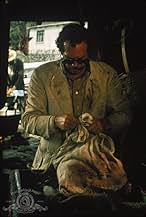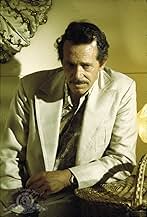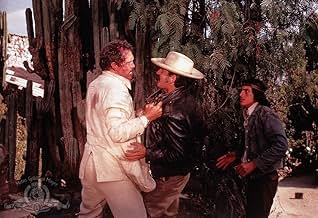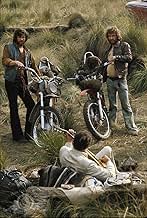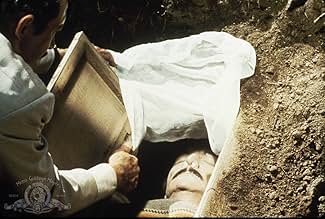Bring mir den Kopf von Alfredo Garcia
Originaltitel: Bring Me the Head of Alfredo Garcia
IMDb-BEWERTUNG
7,4/10
22.601
IHRE BEWERTUNG
Ein amerikanischer Bar-Room-Pianist und seine prostituierte Freundin begeben sich auf eine Reise durch die mexikanische Unterwelt, um ein Kopfgeld auf einen toten Gigolo zu kassieren.Ein amerikanischer Bar-Room-Pianist und seine prostituierte Freundin begeben sich auf eine Reise durch die mexikanische Unterwelt, um ein Kopfgeld auf einen toten Gigolo zu kassieren.Ein amerikanischer Bar-Room-Pianist und seine prostituierte Freundin begeben sich auf eine Reise durch die mexikanische Unterwelt, um ein Kopfgeld auf einen toten Gigolo zu kassieren.
- Auszeichnungen
- 2 Nominierungen insgesamt
Emilio Fernández
- El Jefe
- (as Emilio Fernandez)
Donnie Fritts
- John
- (as Donny Fritts)
Chalo González
- Chalo
- (as Chalo Gonzalez)
Empfohlene Bewertungen
First, I'm sure everyone commenting on this film has seen the documentary on Peckinpah, and the comments made by the film critics regarding this film. If I may quote one of the critics, and I'm sure you all agree "It's the one film of Peckinpah's that everyone tries to imitate". Even Tarantino does to some degree. I have issues with Quentin Tarantino from a cinematic and artistic point of view, but that is another review. Warren Oates' performance was flawless, as he actually assumes the identity Of Sam Peckinpah as a gesture of appreciation for gracing him with his first starring vehicle.
Warren Oates was taking Sam's journey for him, as Sam looked from behind the lens. This movie was Peckinpah at his best and his worst at the same time. The old Peckinpah themes are there; Mexico is the final frontier, where one can continue to be what he once was in a changing world, but eventually Mexico begins to change as well. As I said in my review of "Junior Bonner" (be sure to check it out, and get back to me)progress is the main antagonist in the lives of Peckinpah's characters.
Junior Bonner and Bennie (Oates' Character) have a common foe, the twentieth century, which is why we find Bennie in Mexico. The chance to improve his situation, and establish a solid relationship with his hooker girlfriend (played with tough sincerity by Isela Vega) arrives at a time in Bennie's life when he least expects it, but it's not as easy as it is set out to be. All he has to do is bring this head to "El Hefe", and at the last minute BAM!! Bennie grows a conscience. Along the way he loses his woman, and then just goes nuts, thus revealing "The Diseased Soul of Sam Peckinpah".
My favorite scene is actually the picnic, where Elita and Bennie discuss their future. Elita begs Bennie to ask her to marry her, he does and she begins to weep. The simple fact that he says it is a tender moment, and shows how the slightest thing can arouse a woman's emotions. Jerry Fielding's musical score, which successfully created the mood and atmosphere for "Straw Dogs" (my all time favorite Peckinpah film) is present, but very muted. Still, this may be the best scene of the film.
Sam Peckinpah finally had complete control to dictate the direction of this film; Free from the money men, and left to his own devices in Mexico where he felt at home. A lot of people say that Pat Garret and Billy the Kid was the last Peckinpah masterpiece, but I think Alfredo Garcia was the last one. It throws you off at the beginning with the horses, then all of a sudden a Corvette screeches by; This is the paradox that really signifies that "The West" is over, bringing Sam Peckinpah and his love for the west full circle.
The critics literally hated this film, but 30 years later because of it we have a Martin Scorcese, a Robert Rodriguez, and a Quentin Tarantino (yeah) to name a few, as well as achieving underground cult status. I'm proud to call "Bring Me the Head of Alfredo Garcia" one of my favorite films.
Warren Oates was taking Sam's journey for him, as Sam looked from behind the lens. This movie was Peckinpah at his best and his worst at the same time. The old Peckinpah themes are there; Mexico is the final frontier, where one can continue to be what he once was in a changing world, but eventually Mexico begins to change as well. As I said in my review of "Junior Bonner" (be sure to check it out, and get back to me)progress is the main antagonist in the lives of Peckinpah's characters.
Junior Bonner and Bennie (Oates' Character) have a common foe, the twentieth century, which is why we find Bennie in Mexico. The chance to improve his situation, and establish a solid relationship with his hooker girlfriend (played with tough sincerity by Isela Vega) arrives at a time in Bennie's life when he least expects it, but it's not as easy as it is set out to be. All he has to do is bring this head to "El Hefe", and at the last minute BAM!! Bennie grows a conscience. Along the way he loses his woman, and then just goes nuts, thus revealing "The Diseased Soul of Sam Peckinpah".
My favorite scene is actually the picnic, where Elita and Bennie discuss their future. Elita begs Bennie to ask her to marry her, he does and she begins to weep. The simple fact that he says it is a tender moment, and shows how the slightest thing can arouse a woman's emotions. Jerry Fielding's musical score, which successfully created the mood and atmosphere for "Straw Dogs" (my all time favorite Peckinpah film) is present, but very muted. Still, this may be the best scene of the film.
Sam Peckinpah finally had complete control to dictate the direction of this film; Free from the money men, and left to his own devices in Mexico where he felt at home. A lot of people say that Pat Garret and Billy the Kid was the last Peckinpah masterpiece, but I think Alfredo Garcia was the last one. It throws you off at the beginning with the horses, then all of a sudden a Corvette screeches by; This is the paradox that really signifies that "The West" is over, bringing Sam Peckinpah and his love for the west full circle.
The critics literally hated this film, but 30 years later because of it we have a Martin Scorcese, a Robert Rodriguez, and a Quentin Tarantino (yeah) to name a few, as well as achieving underground cult status. I'm proud to call "Bring Me the Head of Alfredo Garcia" one of my favorite films.
It kills me the way the user comments on the IMDb are so often flooded with basic storyline information and/or outright spoilers. (i.e., "Warren Oates plays Benny, a drunken blah blah blah.") Everybody wants to be the next Roger Ebert (though God knows why.) "Bring Me The Head of Alfredo Garcia" is a title custom-designed to SAY ALL THAT NEEDS TO BE SAID. Tell me THAT title, tell me Warren Oates is in it, and I'm there. Granted, it's been a good 30 years, so some of the particulars of the story have leaked out. But read any other comments here, and you risk knowing more than you should the first time out with this one.
This movie flattened me. Desperation and flies, lots of flies. Yes, Peckinpah's films are violent. When I was a little kid in the early 70s, way before I was allowed to see movies like this, I knew of Peckinpah's reputation. Now I see that the violence herein is a total smokescreen, a sign of the times, a way to sell movie tickets. Human emotion is where these films are really at.
Peckinpah was Jim Thompson with a camera, and he told some great stories in a maverick style. Today's pre-fab, "hip" postmodern filmmakers are not worthy of a brutal, bizarre tale such as this. Sure, Kill Bill was a lot of fun - but the viewer hovers safely on the perimeter, like one flipping noncommittally (if enthusiastically) through the pages of a comic book. You will not be able to view Bring Me The Head of Alfredo Garcia with such entertainment-value indifference. You'll be up all night typing (like me), or drinking, or doing whatever it is you do when your head is reeling from a true cathartic viewing experience.
This movie flattened me. Desperation and flies, lots of flies. Yes, Peckinpah's films are violent. When I was a little kid in the early 70s, way before I was allowed to see movies like this, I knew of Peckinpah's reputation. Now I see that the violence herein is a total smokescreen, a sign of the times, a way to sell movie tickets. Human emotion is where these films are really at.
Peckinpah was Jim Thompson with a camera, and he told some great stories in a maverick style. Today's pre-fab, "hip" postmodern filmmakers are not worthy of a brutal, bizarre tale such as this. Sure, Kill Bill was a lot of fun - but the viewer hovers safely on the perimeter, like one flipping noncommittally (if enthusiastically) through the pages of a comic book. You will not be able to view Bring Me The Head of Alfredo Garcia with such entertainment-value indifference. You'll be up all night typing (like me), or drinking, or doing whatever it is you do when your head is reeling from a true cathartic viewing experience.
This dark and brutal film involves Benny, an American piano player in Mexico (played by Warren Oates) who gets involved with bounty hunters searching for the head of Alfredo Garcia. The head is worth one million dollars, because Garcia got the daughter of a very wealthy and powerful man, pregnant.
The film features plenty of Sam Peckinpah's trademark slow-motion violence in some very well-staged action set pieces. The cast (particularly Oates and Isle Vega, as his Mexican girlfriend) are good, and the film conjures up a powerful atmosphere of despair and casual cruelty and violence.
The film , however, features moments of genuine tenderness between Oates and Vega. Oates plays Benny as a man on the edge. Basically decent but forced to do some pretty horrible things to survive.
Reviled by critics on it's first release, this film will prompt some strong reactions in viewers. While not one of Peckinpah's best films, his enormous talent is still visible throughout this film.
The film features plenty of Sam Peckinpah's trademark slow-motion violence in some very well-staged action set pieces. The cast (particularly Oates and Isle Vega, as his Mexican girlfriend) are good, and the film conjures up a powerful atmosphere of despair and casual cruelty and violence.
The film , however, features moments of genuine tenderness between Oates and Vega. Oates plays Benny as a man on the edge. Basically decent but forced to do some pretty horrible things to survive.
Reviled by critics on it's first release, this film will prompt some strong reactions in viewers. While not one of Peckinpah's best films, his enormous talent is still visible throughout this film.
El Jefe is outraged to find that his daughter has fallen pregnant to a man who has upped and gone, after learning the identity of the rascal (Alfredo Garcia), he offers one million dollars to anyone who can bring him the head of the Lothario running man. On the trail are hit men Quill & Sappensly, Bennie & his prostitute girlfriend Elita, and some other Mexican bandit types, all of them are on a collision course that will bring far more than they all bargained for.
This was the one film where director Sam Peckinpah felt he had the most control, the one where we apparently get his own cut and not some chopped up piece of work from interfering executives. Viewing it now many years after its release it stands up well as a testament to the work of a great director. On the surface it looks trashy, we have homosexual hit men, grave robbing, potential rape, murders abound, prostitution, lower than the low characters, in short the film is awash with Peckinpah traits. Yet it would be a disservice to even think this film isn't rich in thematic texture, for the journey that Bennie that our main protagonist takes is one of meaning. He is a loser, but we find him on this quest to find not only fortune, but respect and love. It's a bloody trail for sure, but it has much depth and no little Peckinpah humour to push the film to the bloody but triumphant finale. Warren Oates is rewarded by Peckinpah for years of sterling work for him by getting the lead role of Bennie, and he grasps it with both hands to turn in a wonderful performance that splits sadness and vibrancy with deft of ease.
Bring Me The Head Of Alfredo Garcia has a harsh quality about it, be it the violence, or be it the sadness of the characters, but what isn't in doubt to me is that it's harshness is cloaked in Peckinpah splendour. 9/10
This was the one film where director Sam Peckinpah felt he had the most control, the one where we apparently get his own cut and not some chopped up piece of work from interfering executives. Viewing it now many years after its release it stands up well as a testament to the work of a great director. On the surface it looks trashy, we have homosexual hit men, grave robbing, potential rape, murders abound, prostitution, lower than the low characters, in short the film is awash with Peckinpah traits. Yet it would be a disservice to even think this film isn't rich in thematic texture, for the journey that Bennie that our main protagonist takes is one of meaning. He is a loser, but we find him on this quest to find not only fortune, but respect and love. It's a bloody trail for sure, but it has much depth and no little Peckinpah humour to push the film to the bloody but triumphant finale. Warren Oates is rewarded by Peckinpah for years of sterling work for him by getting the lead role of Bennie, and he grasps it with both hands to turn in a wonderful performance that splits sadness and vibrancy with deft of ease.
Bring Me The Head Of Alfredo Garcia has a harsh quality about it, be it the violence, or be it the sadness of the characters, but what isn't in doubt to me is that it's harshness is cloaked in Peckinpah splendour. 9/10
It is my humble opinion that Bring Me the Head of Alfredo Garcia comes as close to capturing the maddening drive of man as any movie. That is to say that it sits at the same table as the greats, perhaps across the way from Citizen Kane or Raging Bull. If you contest this it is perhaps only because the film is not as beautiful, not as magnificent, as the rest of its ballpark. I would argue that that is partially the point.
Bennie's quest is stripped to its core so that the brutality of the film is expressive of Bernie himself. There is not a violent film with more validity for its actions than this one, it is the maddening human mind which causes deaths here. Peckinpah shows us everything that is important in this man's life and then shows us what a man is capable of doing once all that is taken away. The difference between this film and other similar films is perhaps that the movie has such humble beginnings. We build ourselves inside of Bennie. When we first meet him he is casually and happily playing the piano, quietly dreaming of settling into a different kind of love. We share a quiet picnic with him, witness his wedding proposal.
Perhaps also there has never been a chaotic killing spree that has seemed this environmental. While usually the hero goes on a rampage in a way that is appropriately heroic itself, Bennie is no hero. He is a man forced into a situation by the world around him, as it seems he is always forced into situations. Since he is never the man he wants to be it seems natural that he would become the kind of man that is the amalgamation of love and hate.
All the emotion a movie in this genre could handle.
Bennie's quest is stripped to its core so that the brutality of the film is expressive of Bernie himself. There is not a violent film with more validity for its actions than this one, it is the maddening human mind which causes deaths here. Peckinpah shows us everything that is important in this man's life and then shows us what a man is capable of doing once all that is taken away. The difference between this film and other similar films is perhaps that the movie has such humble beginnings. We build ourselves inside of Bennie. When we first meet him he is casually and happily playing the piano, quietly dreaming of settling into a different kind of love. We share a quiet picnic with him, witness his wedding proposal.
Perhaps also there has never been a chaotic killing spree that has seemed this environmental. While usually the hero goes on a rampage in a way that is appropriately heroic itself, Bennie is no hero. He is a man forced into a situation by the world around him, as it seems he is always forced into situations. Since he is never the man he wants to be it seems natural that he would become the kind of man that is the amalgamation of love and hate.
All the emotion a movie in this genre could handle.
Wusstest du schon
- WissenswertesAccording to Gordon T. Dawson, principal photography was marked with an overwhelming sense of melancholy and defeat, perhaps engendered by Sam Peckinpah's use of cocaine (introduced to him by Oates). The screenwriter (a veteran of several Peckinpah films) was so unnerved by the shift in Peckinpah's mental state and mercurial behavior that he resolved never to work with him again.
- PatzerAs Bennie crosses inside his apartment, alone, and talks to Alfredo's head, a crewman in black clothing is visible, ducking behind an adjacent transom. His arm reappears a second later, as Bennie reaches for a bottle in the pantry.
- Crazy CreditsThere are only three credits at the beginning of the film: The production credit, the two stars, and the story/screenplay. Everything else is at the end, and the film's title is the very last credit.
- VerbindungenFeatured in Sam Peckinpah - Ein harter Knochen (1993)
- SoundtracksBennie's Song
by Isela Vega
Top-Auswahl
Melde dich zum Bewerten an und greife auf die Watchlist für personalisierte Empfehlungen zu.
- How long is Bring Me the Head of Alfredo Garcia?Powered by Alexa
Details
- Erscheinungsdatum
- Herkunftsländer
- Sprachen
- Auch bekannt als
- Tráiganme la cabeza de Alfredo García
- Drehorte
- Produktionsfirmen
- Weitere beteiligte Unternehmen bei IMDbPro anzeigen
Box Office
- Budget
- 1.500.000 $ (geschätzt)
- Weltweiter Bruttoertrag
- 18.894 $
Zu dieser Seite beitragen
Bearbeitung vorschlagen oder fehlenden Inhalt hinzufügen

Oberste Lücke
By what name was Bring mir den Kopf von Alfredo Garcia (1974) officially released in Canada in French?
Antwort


